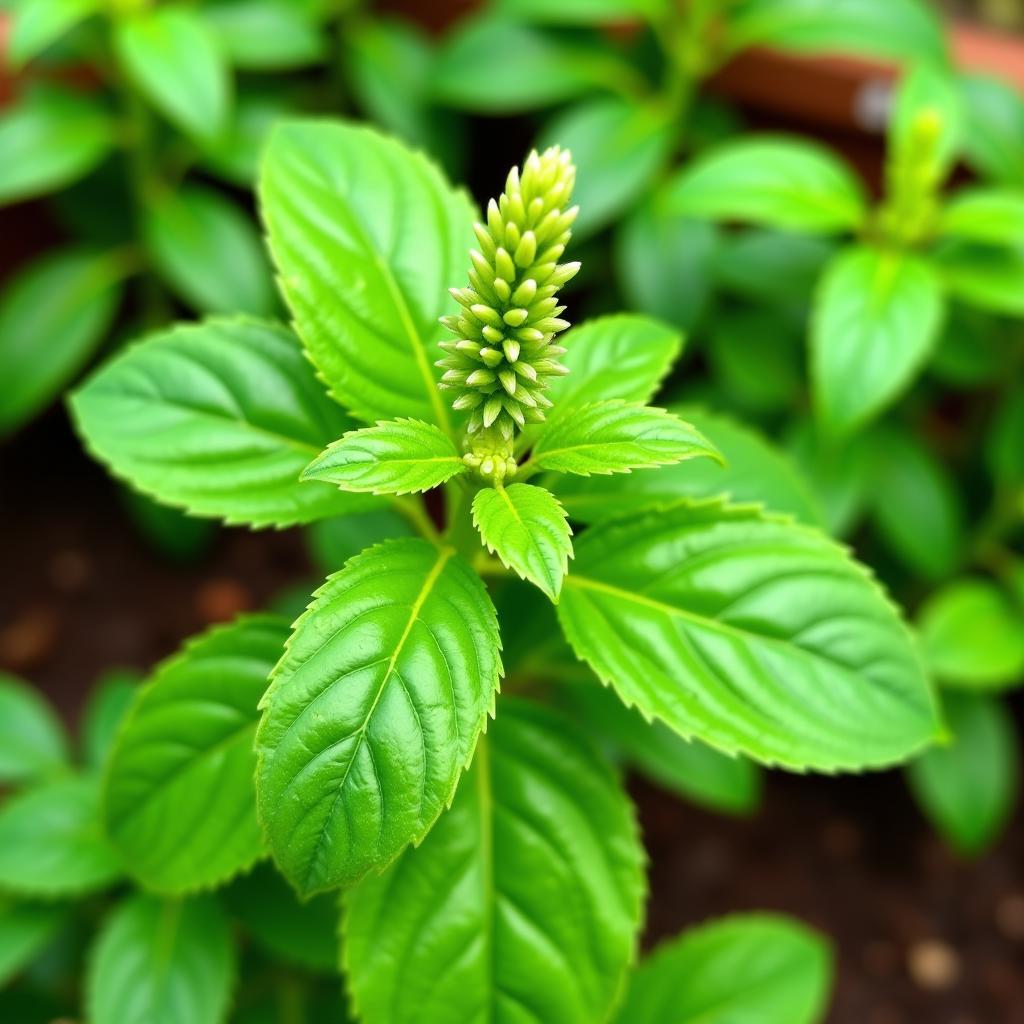The African Basil Plant: A Culinary and Medicinal Star
African basil, also known by its scientific name Ocimum gratissimum, is a fragrant herb native to Africa, Asia, and the Pacific Islands. This versatile plant is not only a staple ingredient in many traditional African dishes, but also boasts a long history of medicinal use. From its distinct aroma to its powerful properties, the African Basil Plant offers a fascinating glimpse into the rich biodiversity and cultural heritage of the African continent.
 African Basil Plant Growing in a Garden
African Basil Plant Growing in a Garden
A Sensory Delight: The Aroma and Flavor of African Basil
African basil is characterized by its pungent, clove-like aroma and slightly peppery, sweet flavor. This unique taste profile comes from the presence of essential oils such as eugenol, thymol, and linalool. These compounds not only contribute to the plant’s distinct taste and smell but also possess potent antimicrobial and antioxidant properties. In many African cultures, African basil leaves are used fresh, dried, or ground into a powder to flavor a variety of dishes.
Culinary Uses: From Stews to Soups and Beyond
Across the African continent, African basil leaves are a beloved ingredient in a wide range of culinary creations. In West Africa, it is commonly used to flavor hearty stews and soups, often paired with tomatoes, onions, and peppers. The herb’s robust flavor also shines in meat dishes, adding a layer of complexity to grilled chicken, fish, and beef. In East Africa, African basil is an essential component of spice blends, infusing dishes with its unique aroma and taste.
Traditional Medicine: Harnessing the Healing Power of Nature
For centuries, African basil has played a vital role in traditional African medicine. Its leaves, stems, and essential oils are believed to possess various therapeutic properties and are used to address a range of ailments. A decoction made from the leaves is often used to alleviate digestive issues, such as stomach aches, bloating, and diarrhea. The herb’s antimicrobial properties make it a popular choice for treating wounds, skin infections, and respiratory problems.
Beyond the Kitchen and Medicine Cabinet: Other Uses of African Basil
The versatility of the African basil plant extends beyond the kitchen and the medicine cabinet. In some African communities, the plant is used as a natural insect repellent, thanks to its strong aroma. The essential oil extracted from African basil is also valued in aromatherapy for its calming and uplifting effects.
Growing African Basil: Tips for Cultivating Your Own
African basil is a relatively easy plant to grow, even for beginner gardeners. It thrives in warm, sunny climates and well-drained soil. Here are some tips for cultivating your own African basil:
- Sunlight: Choose a location in your garden that receives at least 6 hours of sunlight per day.
- Soil: Use well-drained soil that is rich in organic matter.
- Watering: Water regularly, especially during dry periods. Allow the soil to dry slightly between waterings.
- Fertilizer: Feed with a balanced fertilizer every 4-6 weeks during the growing season.
- Harvesting: Harvest leaves regularly to encourage bushier growth. Pinch off flower buds to prevent the plant from going to seed.
African Basil: A Testament to African Biodiversity
The African basil plant is a testament to the incredible biodiversity and rich cultural heritage of the African continent. From its culinary versatility to its medicinal properties, African basil has played a vital role in the lives of many African communities for centuries. Whether used to add flavor to a delicious stew or to soothe an upset stomach, this remarkable herb continues to captivate and inspire. For those eager to explore the vibrant flavors and traditional remedies of Africa, the African basil plant is an excellent place to start. Are you interested in learning more about traditional African remedies? Discover the benefits of African cough syrup or explore the soothing properties of African chicken soup.
FAQ
1. What is the difference between African basil and regular basil?
While both belong to the same family, African basil has a more pungent, clove-like aroma and a slightly peppery taste compared to the sweeter flavor of regular basil.
2. Can I use African basil interchangeably with regular basil in recipes?
While you can substitute one for the other, keep in mind that the stronger flavor of African basil can significantly alter the taste of your dish.
3. Where can I buy African basil?
You can often find fresh African basil at specialty grocery stores or farmers markets. Dried leaves and essential oil are also available online.
4. How do I store fresh African basil?
Store fresh African basil leaves in the refrigerator, wrapped in a damp paper towel, for up to a week.
5. Are there any precautions I should take when using African basil?
While generally safe for consumption, pregnant women and individuals with certain medical conditions should consult with a healthcare professional before using African basil medicinally.
Need More Information?
Discover the diverse world of African cuisine and explore the unique flavors of the continent. Learn about African chicken with herbs and spices or embark on a culinary journey by visiting an African cuisine restaurant. To understand the weight management potential of traditional ingredients, delve into the topic of African berry reduce weight.
For any inquiries or assistance, please don’t hesitate to contact us at:
Phone Number: +255768904061
Email: [email protected]
Visit our location: Mbarali DC Mawindi, Kangaga, Tanzania.
Our dedicated customer support team is available 24/7 to assist you.

